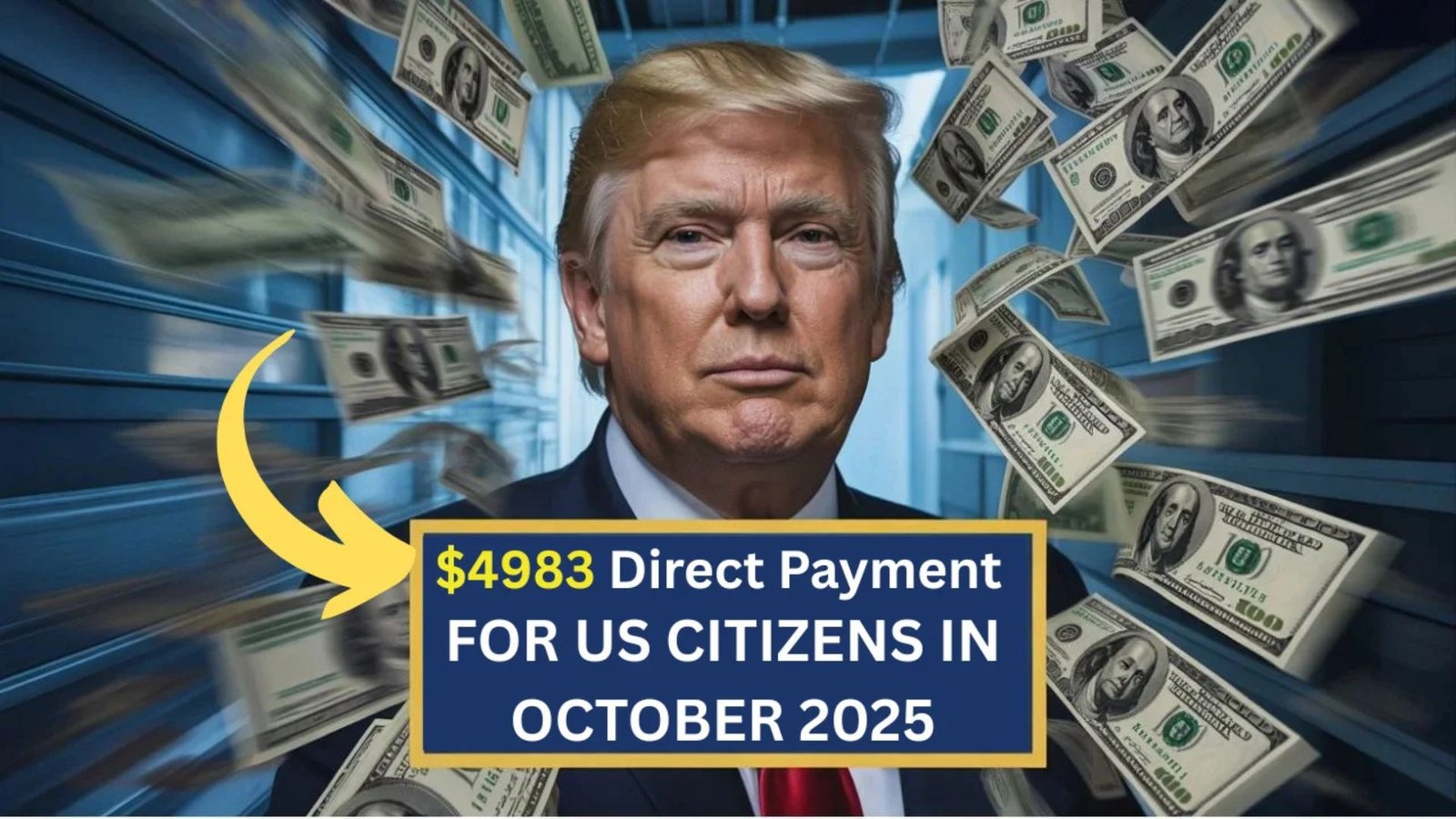Are you wondering if you qualify for the $4,983 direct deposit in October 2025? This guide breaks down everything you need to know about this payment, including who’s eligible, when it’s coming, and how to follow IRS instructions. We’ve simplified the details to help you understand your options and take action. Let’s dive into the essentials of this direct deposit opportunity!
What Is the $4,983 Direct Deposit?
The $4,983 direct deposit is part of a financial relief program aimed at supporting eligible U.S. citizens in 2025. This payment is designed to provide economic assistance to individuals and families facing financial challenges. Unlike loans, this is a non-repayable deposit, meaning you don’t have to pay it back. The IRS oversees the distribution, ensuring funds reach those who qualify.
Why Was This Program Created?
The program was introduced to help Americans cope with rising costs and economic uncertainty. It targets specific groups, such as low-income households, seniors, and disabled individuals, to provide immediate financial relief. By depositing funds directly into bank accounts, the IRS ensures quick and secure access to these funds.
Who Qualifies for the $4,983 Direct Deposit?
Not everyone is eligible for this payment. The IRS has set clear criteria to determine who can receive the $4,983 direct deposit. Below is a simple breakdown of the eligibility requirements:
Eligibility Criteria
| Requirement | Details |
|---|---|
| Citizenship | Must be a U.S. citizen or legal resident. |
| Income Level | Adjusted gross income (AGI) below $75,000 (single) or $150,000 (married). |
| Age or Status | Seniors (65+), disabled individuals, or low-income families may qualify. |
| Tax Filing | Must have filed a 2024 tax return or registered with the IRS non-filer tool. |
| Bank Account | Must have a valid U.S. bank account for direct deposit. |
Special Cases
- Non-Filers: If you don’t usually file taxes, you can still qualify by using the IRS non-filer portal.
- Dependents: Adults with dependents may receive additional funds, depending on their tax filing status.
- Social Security Recipients: Those receiving Social Security or disability benefits may automatically qualify.
When Will the $4,983 Direct Deposit Be Paid?
The IRS has scheduled the $4,983 direct deposit payments for October 2025, but exact dates depend on your situation. Here’s what to expect:
Payment Schedule
| Group | Payment Date |
|---|---|
| Social Security Recipients | October 8, 2025 |
| Direct Deposit (Tax Filers) | October 15–20, 2025 |
| Non-Filers | October 25–30, 2025 |
- Direct Deposit: Funds will hit your bank account faster if you’ve provided bank details to the IRS.
- Paper Checks: If you don’t have a bank account, expect a mailed check, which may take 2–3 weeks longer.
- Delays: Missing information or errors in your IRS records could delay your payment.
How to Ensure You Receive the $4,983 Direct Deposit
To get your payment on time, follow these IRS instructions:
Step-by-Step Guide
- Check Your Eligibility: Confirm you meet the income, citizenship, and tax filing requirements.
- Update Bank Details: Log in to the IRS portal or your tax account to verify your bank information.
- File Your 2024 Taxes: If you haven’t filed, do so by the deadline or use the IRS non-filer tool.
- Monitor Your Account: Check your bank account around the scheduled payment dates.
- Contact the IRS: If you don’t receive your payment, reach out to the IRS helpline or visit their website.
IRS Tools and Resources
- IRS Website: Visit www.irs.gov for updates and FAQs about the direct deposit program.
- Non-Filer Portal: Use this tool if you don’t file taxes but want to register for the payment.
- IRS Helpline: Call 1-800-829-1040 for assistance with payment issues.
Common Questions About the $4,983 Direct Deposit
Is the Payment Taxable?
No, the $4,983 direct deposit is not considered taxable income. You won’t need to report it on your 2025 tax return.
What If I Miss the Payment?
If you don’t receive your payment by November 2025, contact the IRS immediately. You may need to file a claim or correct your information.
Can Non-Residents Qualify?
Non-residents or those without a valid Social Security number are generally not eligible. However, legal residents with a valid SSN may qualify.
Tips to Maximize Your Direct Deposit Benefits
- Set Up Alerts: Enable bank notifications to know when the deposit arrives.
- Budget Wisely: Plan how to use the funds, whether for bills, savings, or essential expenses.
- Avoid Scams: Beware of fraudulent messages claiming to offer the payment. The IRS will never ask for payment or sensitive information via email or text.
Why This Direct Deposit Matters
The $4,983 direct deposit can make a big difference for eligible Americans, offering financial relief during tough times. Whether you’re paying off debt, covering medical expenses, or saving for the future, this payment provides a valuable boost. By understanding the eligibility rules, payment dates, and IRS instructions, you can ensure you receive your funds without delays.
Stay Informed
Keep an eye on the IRS website for any updates about the direct deposit program. If you’re unsure about your eligibility or payment status, don’t hesitate to reach out to the IRS or a tax professional.




